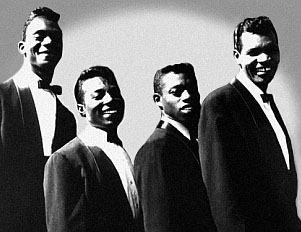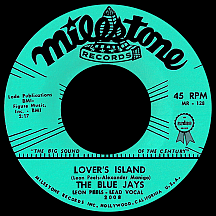THE BLUE JAYS
Lover's Island
The Milestone record company of Hollywood, California was unusual in that it was owned and operated by Werly Fairburn, a country singer from Louisiana once billed as "The Delta Balladeer." His first recordings ("Camping With Marie," "I Feel Like Cryin'") appeared in 1953 on the Mississippi-based Trumpet label. Over the next few years he bounced from Capitol to Columbia to Savoy and often performed on KWKH radio's Louisiana Hayride, broadcast from Shreveport, where he struck up a friendship with another up-and-comer, Elvis Presley. Werly scored a few times as a songwriter; "I Guess I'm Crazy" was a C&W hit for Tommy Collins in the fall of 1955 (and a much bigger hit for Jim Reeves nine years later, just after that singer's death in a plane crash). In 1956, during Werly's time at Columbia, labelmate Carl Smith turned "I Feel Like Cryin'" into a top seller. At Savoy in '56 and '57, Fairburn and his band The Delta Boys leaned ever closer to rock and roll with songs like "All the Time" and "Telephone Baby." By 1959 he was rocking harder; that year he established Milestone ("The Big Sound of the Century," or so the labels proclaimed) with "Black Widow Spider Woman," a scorcher he recorded and released under the more aggressive moniker Jack Hammer and the Pacers.
It made sense to stick with country and rockabilly artists in his new venture, so many (in the music industry, at least) were surprised when he wound up making his mark with doo wop acts. The Paradons, a black quartet from Bakersfield headed by singer West Tyler, had come to his attention through associates, so he gave them a chance and the first of three singles, "Diamonds and Pearls," came up big, hitting the L.A. top five in September 1960 before climbing into Billboard's top 20 the following month. 18 singles were released on Milestone between 1959 and 1963, many of the country and teen ballad variety, but only one other caught on. It was an original doo wop song, not entirely unlike the Paradons' sole hit, by a similar quartet, The Blue Jays.
Newport, Arkansas-born Leon Peels spent his teenage years in Venice, California, coincidentally not far from Newport Beach. Around 1959 the former high school track star started spending a lot of time playing basketball at the Oakwood Park Rec Center in Venice. Three acquaintances (tenor Alex Manigo and baritone Van Richardson, both from Santa Monica, and bass Leonard "Tree Tall Len" Davidson, who'd moved to the west coast from Philadelphia) frequently joined the gap-toothed balladeer for some '50s-style street-corner (or in this case outside courtside) vocal group harmony. Leon was married with a child and worked as a cook at the Goody Goody Drive-In on Wilshire Boulevard a couple of miles away in Santa Monica, yet he held fast to his showbiz dreams while supporting his family by doing whatever work was necessary.
In 1961 the unnamed group participated in an amateur talent contest at the Fox Venice Theatre, after which Werly, on the lookout for his next big moneymaker, signed them to Milestone. The quartet still didn't have a name but liked the "bird groups" and decided on the Blue Jays. There had already been several known acts by the same name: one from the Washington, D.C. area that became The Five Blue Notes in the early '50s, another on Checker, an L.A. group, The Squires, that called themselves the Blue Jays when recording knockoff "hits" discs, later-'50s Blue Jays on Laurie and Roulette and probably even more. Plus, saxophonist Big Jay McNeely's band had used the name for a few years.

What mattered was that "Lover's Island," written by group members Leon and Alex, was and still is a great doo wop ballad. Venice Pier provided the atmosphere that sparked the idea; Edenesque lyrics ('...and love never grows old') materialized. With tight vocals covering a wide range between high and low, it fit right into the "doo wop revival" destined for decline that nevertheless happened to be peaking in 1960 and '61. Fairburn was well-liked by the deejays in Los Angeles; the single fared as well as the Paradons record had, reaching the top five in June and July 1961. Then it worked its way to the New York airwaves, though its impact in many eastern cities was disappointing. Ultimately the single reached the national top 40 for a few weeks at the start of the school year.
Back in Santa Monica, Leon Peels continued flipping burgers at the Goody Goody between performing with the group in Southern California ballrooms. The B sides revealed an uptempo inclination; "You're Gonna Cry" might have better served the group as a follow-up single. Instead they went with "Tears Are Falling," a Peels-penned ballad that was kind of like "Lover's" without the "Island." The disc received a great deal of spins locally the first two months in 1962, though Werly was unable to get it going outside L.A. The single's biographical flip, "Tree Tall Len," featured Alex's lead vocal and song subject Leonard's claim: "Love is my game!"
Three more 45s took them through mid-1962 (the last was "Venus My Love," its title inspired by a similar line in "Lover's Island") before the group decided to part. Fairburn kept Milestone going another year, working closely with Jackson and Madelon Baker, who ran Audio Arts, the studio where some of the tracks were laid down. The Hi Tensions, a Los Angeles-area quintet with lead singer Bobby Parker and a 1961 single ("The Clock") to their credit, delivered Milestone's swan song, "Ebbing of the Tide." Fairburn contacted Peels about making more records, the result being "A Casual Kiss," featuring the Hi Tensions, on the Whirlybird label (named after Werly, it would seem); L.A. radio again welcomed Leon's ap-peel-ingly romantic baritone sound; the single hit KRLA's top ten in July 1964 but never rose above "Bubbling" status nationally.
A mistake too often made: "A Magic Island" came off as a near-carbon-copy of the Blue Jays' "Lover's Island" and it was the end of the line for the Hi Tensions and Leon Peels. For the latter, a reunion occurred a quarter-century later when the group performed at a doo wop show in Lakewood, California and made one final 45 in 1989, "Once Upon a Love," as Leon Peels and the Blue Jays. Leon died in 1999, but several years earlier he'd spent some quality time touring under the Blue Jays banner after other original members had passed on the opportunity. Around that same time, a famous 25-man Blue Jays lineup from Toronto, Ontario became the first and only Canadian baseball team to win the World Series...twice, in 1992 and '93. It's a "bird group" name that has remained with us...in one form or another!


